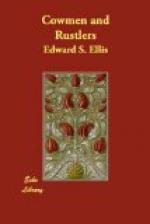The instant Budd’s feet were in the stirrups he set his horse bounding along the side of the herd, with the purpose of checking the stampede by changing its course. Grizzly understood matters and set off after him, leaving to the sagacious Cap to thread his way to the other side of the running cattle.
In the course of a few minutes the ranchers opened communication and pushed their work with a vigor which brought good results. The cattle were tired. They had been on their feet most of the day while grazing, were growing fat, and naturally were indisposed to severe exertion. Their pace dropped to a walk, and sooner than would have been supposed, the fright passed off. The herders kept them moving until close to the main herd, where they were allowed to rest. Budd and Grizzly dismounted once more, turning their horses loose, and seated themselves on the ground. The night, as will be remembered, was mild, and they did not need their blankets to make them comfortable.
“Wal,” was the smiling remark of Grizzly, as he began refilling his pipe, “my leg didn’t deceive me this time.”
“No, I’ll own up it played square; but, Grizzly, if we’ve got to fight the red varmints as well as rustlers, there will be some lively fun in Wyoming and Montana before the thing is over.”
“The Injins won’t take a hand in this. You know who them two thieves were, don’t you?”
“A couple of ‘dog Injins,’ of course.”
“There isn’t anybody else that’s got anything to do with this; it’s sort of queer—that is, it has struck me so two or three times—that the Injins have tramps among ’em the same as white folks. They call ’em ‘dog Injins,’ I s’pose, ’cause they don’t claim any particular tribe, but tramp back and forth over the country, slipping off their reservations whenever they get a chance.”
“Yes, there are plenty of ’em,” assented Budd; “we’ve met ’em before; you’ll find ’em as far north as the Saskatchewan and as low down as the Rio Grande. But I say, Grizzly, they were two slick ones; I never seen finer work.”
“Nor me either; if they had been satisfied with taking our hosses we’d never seen ’em agin. Gracious!” added the rancher, “for myself, I’d rather lost half the herd than Cap.”
“It seems to me,” said Budd, after smoking a moment in silence, “that although them ‘dog Injins’ was pretty smart in getting out of the way when we come down on ’em, they weren’t smart in trying to run off the cattle. They must have known we’d find it out at daylight and would be after ’em hot-footed.”
Grizzly had been puzzling over the same phase of the question. The ‘dog Indian’ is a vagabond, who, belonging to some particular tribe, as of necessity must be the case, affiliates with none, but goes whithersoever his will leads him, provided he is not prevented. Sometimes they remain on the reservation for weeks and months, as orderly, industrious and well-behaved as the best of the red men. Then they disappear, and may not turn up for a long time. In truth, they are as likely not to turn up at all, but to lead their wandering, useless lives just as the vagrants do in civilized communities.




